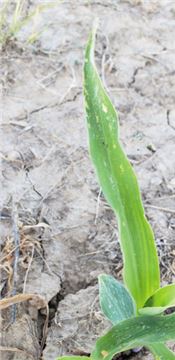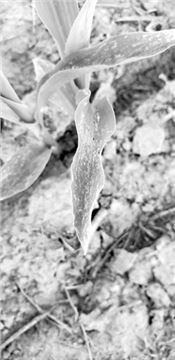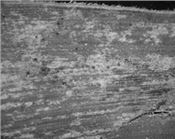As Rains Stopped, Thrips Started To Move Into Late-Planted Corn
DR. RAUL T. VILLANUEVA
PRINCETON, KY.
During the second week of June 2020, I noticed some soybean fields with thrips feeding. Soybeans usually are not heavily impacted by thrips and plants recover. Later that week, the Plant Disease Diagnostic Laboratory at the University of Kentucky’s Research and Education Center in Princeton received seedlings of late-planted corn showing symptoms of thrips feeding (Figure 1). I found similar damage this weekend while scouting for pests in corn (Figure 2).
scars that, when caused by a great number of thrips, result in entire leaves or even plants appearing desiccated. This type of damage is frequently observed when rains are absent, during extended periods of hot, dry weather conditions, and when plants are stressed.
Description of Thrips
In Kentucky, several species of thrips can affect corn; however, the grass thrips may be the most common species of thrips found in seedling corn. Adult thrips have two pairs of feather-like wings and are dark in color (Figure 2). The immature instars or nymphs are yellow or orange slender insects about 1/16 inch (1.6 mm) long.
Management
If drought persists for long periods, plants may become grayish in color and wilt. Severe thrips outbreaks in seedling corn can stunt plants, and insecticide treatment may be justified; however, thrips are a sporadic pest in corn and the threshold for this insect is not established. Usually, young corn plants outgrow the injury and insecticides are not necessary. ∆
DR. RAUL T. VILLANUEVA: Entomology Extension Specialist, University of Kentucky

Figure 1. Late planted seedling corn with damage caused by thrips.

Figure 2. Damage caused by thrips in seedling corn. Arrows shown two adult thrips
Photo: Raul Villanueva, UK

Figure 3. Close-up of feeding damage caused by thrips in corn; the distinctive black spots are the
frass deposited by thrips.
Photo: Brenda Kennedy, UK